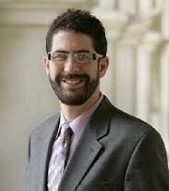The Torah this week introduces us to Abraham and Sarah, our soon-to-be parents of monotheism. Each year, I find the call from God familiar, yet still chilling: ‘lech l’cha,’ get up and leave your place of familiarity and comfort to journey to this new place, one that you don’t know, but which will help to bring blessings into the world. God calls Abraham to shake up his status quo, see beyond the immediate, and realize that there is a bigger picture to life, and existence, than the idols and trivialities that dominated society in Haran.
A famous midrash (Bereshit Rabbah 39:1) tells us that, as Abraham was journeying, he came across a burning palace. “Is it possible that this palace has no master?” asks Abraham. Whereupon God looks out from the palace and says, “I am the master of this palace.” It is here that Abraham discovers morality and, perhaps, conscience. The question on my mind for this parshah is about how we can today, like Abraham, expand our vision, see beyond our immediate interests (Look! A burning palace!) and into that next realm (Who is in charge of it?).
In his 1963 address, “Religion and Race,” Abraham Joshua Heschel said what I think is a perfect articulation of what lech l’cha meant to Abraham. He says,
Human self-interest is often our Nemesis! It is the audacity of faith that redeems us. To have faith is to be ahead of one’s normal thoughts, to transcend confused motivations… Mere knowledge or belief is too feeble to be a cure of man’s hostility to man…The only remedy is personal sacrifice: to abandon, to reject what seems dear and even plausible for the sake of the greater truth; to do more than one is ready to understand for the sake of God. Required is a breakthrough, a leap of action. It is the deed that will purify the heart…The deed is the test, the trial and the risk. (Insecurity of Freedom, p. 97)
Wherever we look today, we can see the results of our inability to pass this test. I am particularly taken, and dismayed, that the racial justice issues Heschel was addressing in 1963 are again taking center stage. Standing with the black community, as the Jewish community continues to do, is one way to reach for Abraham’s vision. No longer can we say, “Just get over slavery,” or that we have moved on, that our society is so much better than before. From Ferguson to Charlottesville, we know that there is much work to be done to overcome racism: in the nature of our national blindness to the ongoing suffering of communities of color; in the justice and prison systems that continue to have racism systematically enforced; and with generations of housing, employment, and financial discrimination.
The vision of Abraham, of conscience, calls us to see the tower burning and to be the hands of the master, the hands of the divine, in putting out the flames. Overcoming ourselves, our narrow self-interest, takes risk, takes sacrifice, and takes the moral courage to go against the grain of society, to shatter idols and to demand justice and equality. The deed is the risk.
Abraham risked everything to pursue a new way of being in the world. He was called to be a blessing. What are we willing to risk to renew that way of being into our world?
Rabbi Joshua Levine Grater is Executive Director of Friends in Need, an interfaith collaborative dedicated to meeting the many needs of the most vulnerable residents of greater Pasadena, CA. He is a member of the board of T’ruah and of the National Religious Campaign Against Torture.

